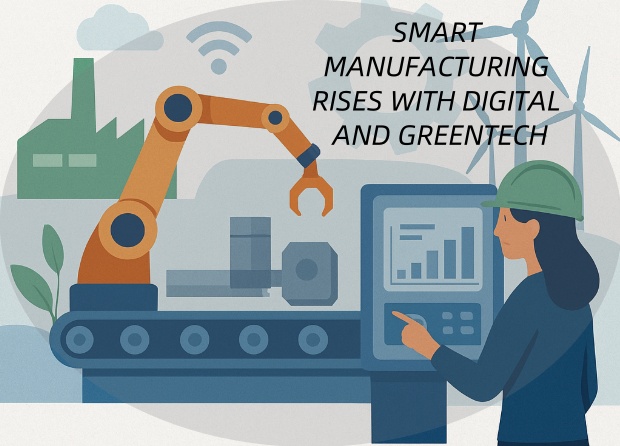Aug
The manufacturing industry is undergoing a seismic shift, driven by rapid digitalization and a growing commitment to sustainability.
As global competition intensifies, companies are embracing advanced technologies to streamline operations, cut costs, and reduce environmental impact.
This dual focus on digital transformation and green initiatives is shaping a new era of industrial progress.
According to a recent Deloitte survey, over 70% of manufacturers have already adopted digital technologies such as IoT, AI, and cloud platforms.
These tools are enabling predictive maintenance, real-time monitoring, and automated quality control. Smart factories, once considered futuristic, are now becoming the norm.
For example, AI-powered analytics help manufacturers optimize production schedules, reducing downtime and increasing output.
Cloud-based platforms also allow global teams to collaborate seamlessly, accelerating decision-making and cutting lead times.
While digitalization enhances efficiency, sustainability is emerging as the second major pillar of modern manufacturing.
A 2023 World Economic Forum report highlights that 65% of industrial leaders now rank sustainability as a top business priority.
Companies are investing in energy-efficient equipment, renewable energy sources, and waste reduction strategies.
Digital twins—virtual replicas of physical systems—are being used to test new designs and improve efficiency without consuming real-world resources.
These practices not only reduce carbon footprints but also improve brand reputation in an increasingly eco-conscious market.

The most successful organizations are those that integrate digital tools with sustainability goals.
For instance, smart sensors can track energy usage across production lines, identifying inefficiencies and reducing waste.
Machine learning algorithms help predict demand more accurately, lowering overproduction and excess inventory.
This convergence not only cuts costs but also strengthens resilience.
As supply chains face disruptions, digitalized and sustainable practices provide manufacturers with the flexibility needed to adapt quickly.
Industry analysts project that the global smart manufacturing market will exceed USD 450 billion by 2030, with sustainability-related investments driving much of this growth.
Governments worldwide are also providing incentives for companies to adopt clean technologies, reinforcing the momentum.
For manufacturers, the message is clear: embracing digitalization and sustainability is no longer optional—it is the foundation for future competitiveness.
As a global leader in industrial automation, Amikon Limited supports this transformation by providing high-quality automation spare parts and solutions.
With a strong commitment to innovation and service, Amikon helps manufacturers achieve both operational excellence and sustainable growth.
For inquiries, please contact:
May --- Email: sales5@amikon.cn